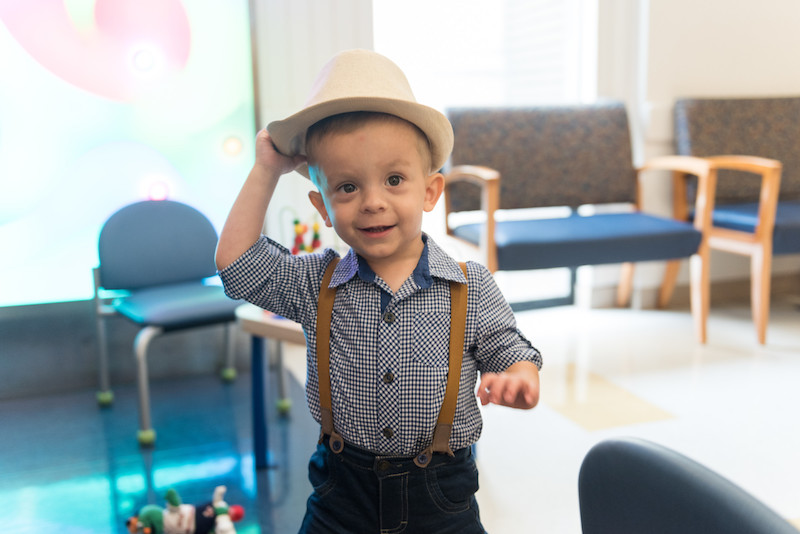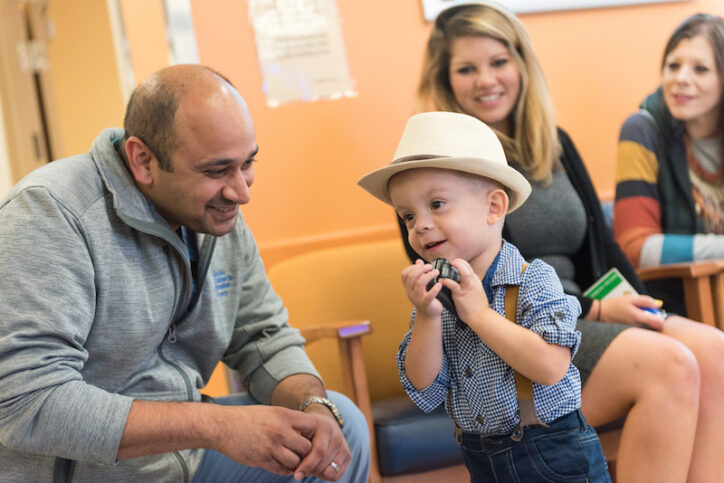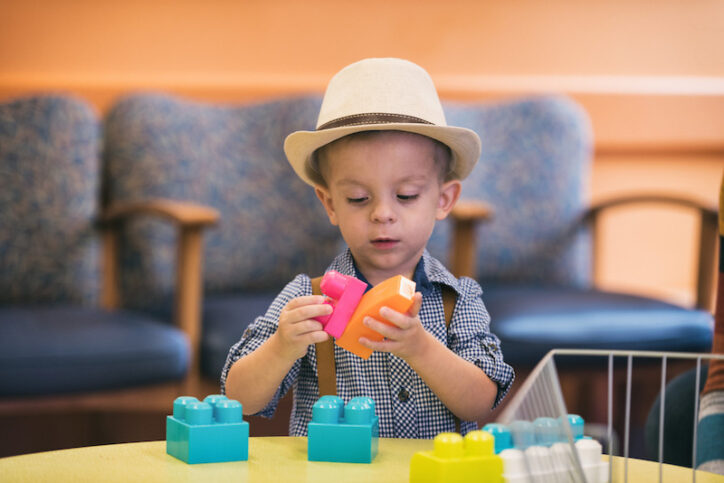Living his best life: Caring for Christian

Christian Jaspersen was wet, muddy — and having the time of his life. After an ATV ride around his family’s rural Oklahoma farm with their grandfather, he and his two older brothers plopped themselves into a nearby mud puddle, playing with toy trucks and getting wonderfully messy. “For a while, we didn’t know if Christian would be able to have a ‘normal’ childhood,” says his mother, Rachel. “Having these experiences now is just so special.”
Indeed, Christian, now 2 years old, spent nearly five months in his local neonatal intensive care unit (NICU) after being born with gastroschisis. In this congenital anomaly, the intestines and other abdominal organs can protrude outside the body, which can lead to poor bowel function or the loss of healthy intestinal tissue.
Although his clinicians initially believed that they could successfully salvage and reconnect his intestines, the opposite proved true: They determined that more of the little boy’s intestines would need to be removed, leaving him with short bowel syndrome, a serious condition that makes it difficult to absorb the nutrients necessary to grow and thrive.

Seeking a second opinion
As a result, Christian had to rely on intravenous parenteral nutrition (PN) — and it was unclear whether he would ever regain bowel function. Frustrated, Rachel and her husband, Jon, sought a second opinion from the Center for Advanced Intestinal Rehabilitation (CAIR) at Boston Children’s Hospital. In March 2018, they made their first trip to Boston to meet with Dr. Biren Modi and the rest of the CAIR team.
“Dr. Modi immediately outlined four possible surgical techniques that he could use to reconnect Christian’s intestines,” says Rachel. “But when I asked him how much he would need to remove, he told us that it wasn’t even an option not to save the intestines. I knew then that we had made the right decision.”

A catalyst for change
When he was a year old, Christian underwent successful reconnection surgery — but he soon faced another challenge. After performing a liver biopsy, Dr. Modi found that Christian had significant fibrotic liver disease, a risk associated with long-term PN. “We had been told that the liver heals itself and that high enzymes were nothing to worry about,” remembers Rachel. “I believe that he would still be on PN — and possibly on his deathbed — if we hadn’t come to Boston.”
Instead, Christian has been able to transition off intravenous nutrition to nutrition via a gastrostomy (G-tube) and, thanks to feeding therapy, has been experimenting with eating by mouth, too. He loves playing with his brothers, meeting new people and even taking airplane rides to return to Boston for checkups. His liver health has stabilized, and his parents and care team are optimistic that he won’t need a liver transplant in the future.
If he does, however, Rachel will be ready to help: After learning about her son’s liver damage last year, she underwent a vertical sleeve gastrectomy and lost nearly 150 pounds to become an eligible organ donor. “If it hadn’t been for Christian’s comprehensive care, I probably never would have sought my own medical treatment,” she says. “Christian is my inspiration and motivation, but Boston Children’s was the catalyst for both of us living our best lives.”
Related Posts :
-

Then and now: Catching up with some of our short bowel syndrome kids
Also known as “short gut,” short bowel syndrome is a life-threatening condition in which a lack of functioning intestine can ...
-

Catching up with Lucas eight years after his multivisceral transplant
Lucas and his mom, Heather, aren’t shy talking about his health journey and his multivisceral transplant. “If other families ...
-

‘The reason I became a nurse’: Maeve’s memories of laryngeal cleft repair
Being a gastroenterology nurse is more than a profession for Maeve Lee. When she cares for patients with feeding tubes, ...
-

Studies pinpoint risk factors for complications of pediatric intestinal failure
Pediatric intestinal failure occurs when patients lack the amount of intestine necessary for growth and development. As advances in treatment ...





